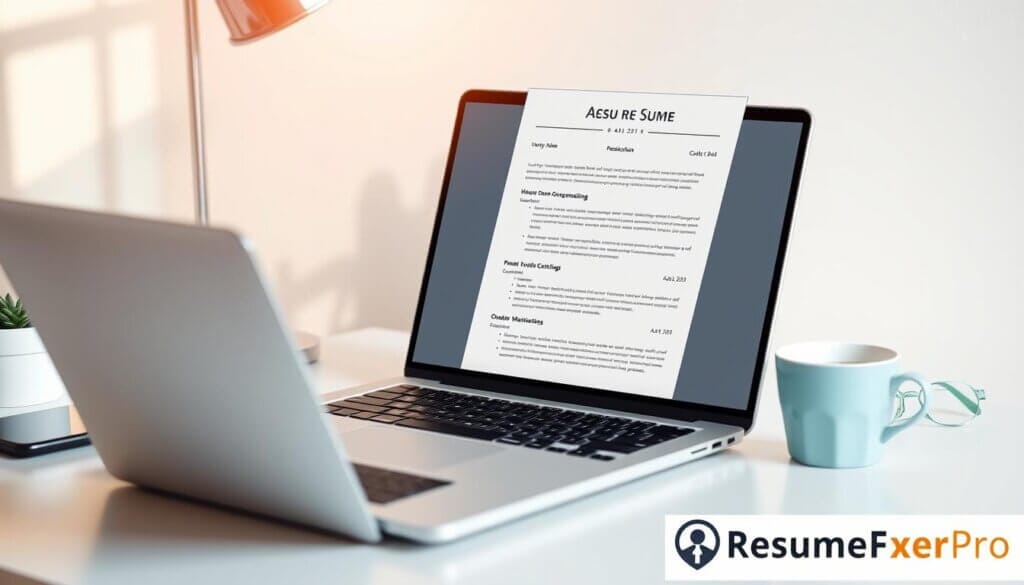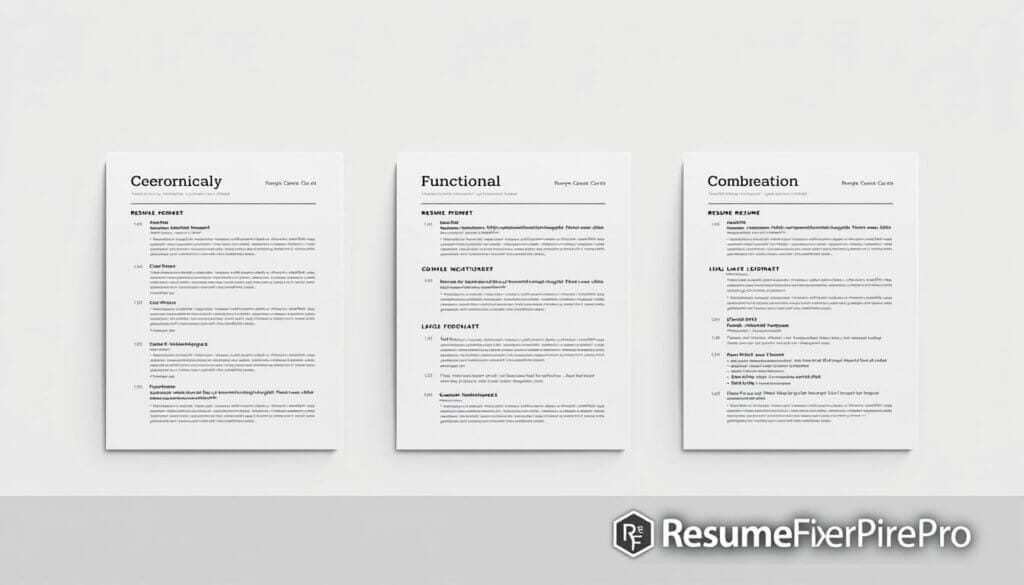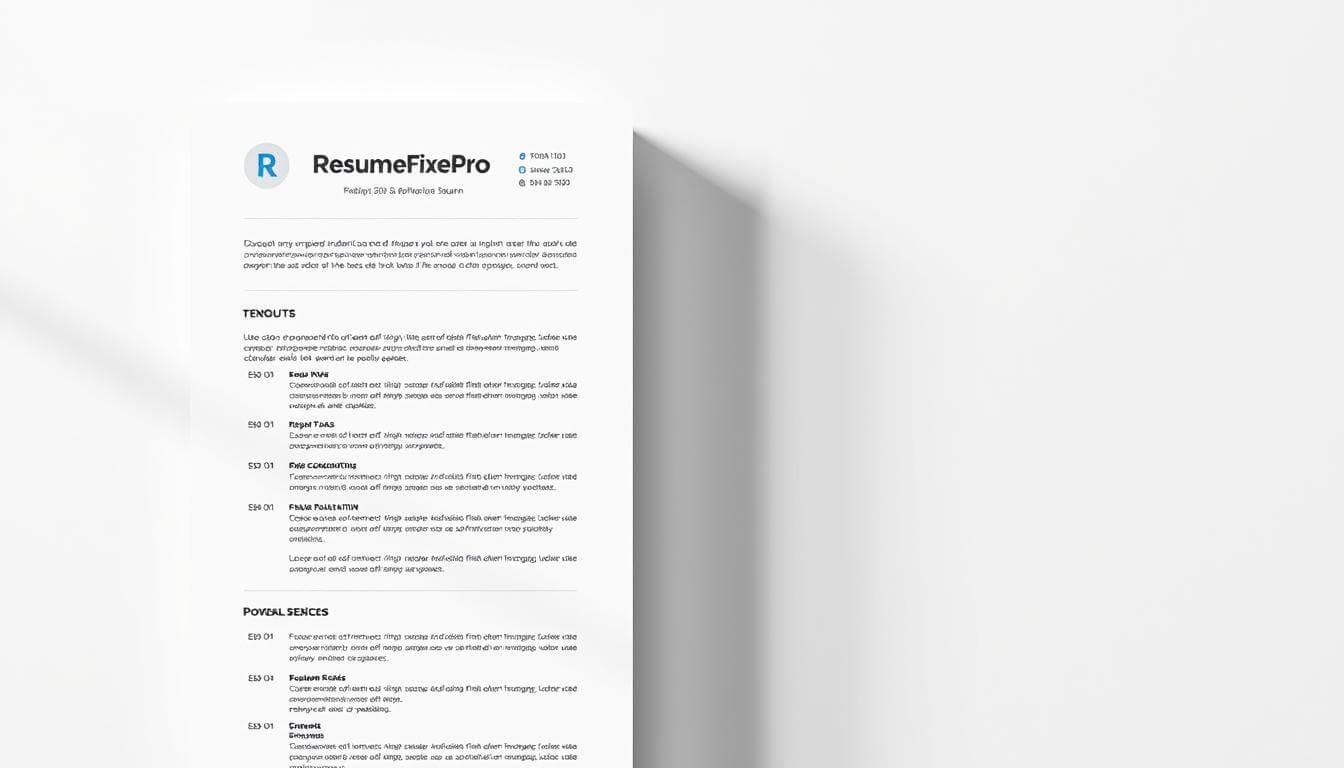Getting your dream job starts with a strong first impression. For students starting work in 2025, a well-structured resume is key. The job market is changing, and so are what employers look for.
This guide will help you create a resume that works for both ATS systems and human eyes. Whether you’re in Business, Engineering, or any field, we have tips to make your application shine.
You’ll learn how to format your resume, avoid common mistakes, and get free templates. Real examples show how small changes can make a big difference.
Key Takeaways
- Understand 2025 job market trends for student applications
- Optimize for both ATS systems and hiring managers
- Discover industry-specific formatting approaches
- Access free, customizable templates
- Learn from real student success stories
Why Your Resume Format Matters in 2025
Your career start depends on your resume meeting today’s hiring standards. Employers use both AI and human judgment, making a clear structure essential.

Table of Contents
First Impressions Count: How Recruiters Scan Resumes
Studies show recruiters spend just 6 seconds on their first scan. Eye-tracking research shows they look at:
- Contact information (top-center)
- Job titles and companies (left-aligned)
- Dates of employment (right-aligned)
Creative fields might allow more design freedom. But corporate roles prefer clean, traditional layouts.
ATS Compatibility: Why It’s Non-Negotiable
Applicant tracking systems reject 75% of submissions before humans see them. These tools read content differently than people:
| Feature | Human-Friendly | ATS-Optimized |
|---|---|---|
| Headers | “Work History” | “Experience” (standardized) |
| Keywords | Varied synonyms | Mirrors job description |
| Design | Icons, colors | Black/white, simple fonts |
Source: Enhancv 2025 ATS Report
Tip: Save files as .docx or .pdf—some systems struggle with fancy templates.
Top 3 Resume Formats Explained
Choosing the right layout is crucial in 2025. Each style has its purpose—whether you’re showing career growth, transferable skills, or both. Here’s how to pick the best one for you.

Reverse-Chronological: The Gold Standard
Most employers, 90%, prefer this format. It lists your work history from newest to oldest. It’s great for students with internships or part-time jobs. Use concise bullet points to highlight achievements, not just duties.
For example, a marketing student might highlight a summer internship’s campaign results before listing campus leadership roles.
Functional: Skills-First Approach
This functional resume format focuses on your skills, not job titles. Group relevant talents under headers like “Digital Marketing” or “Data Analysis.” It’s best for career changers or those with employment gaps.
Example: An engineering grad transitioning to tech sales could emphasize communication and project management skills.
Hybrid: Best of Both Worlds
Blend the chronological resume format’s clear structure with the functional style’s adaptability. Start with a skills summary, followed by a brief work history. This is perfect for students with varied experiences.
Example: A business major with freelance jobs and volunteer work can use this format. It shows their versatility.
| Format | Best For | ATS Compatibility |
|---|---|---|
| Reverse-Chronological | Traditional industries | High |
| Functional | Career changers | Moderate |
| Hybrid | Multidisciplinary roles | High |
Quick tip: Always align your resume layout with the job description’s keywords. ATS systems favor relevance.
Choosing the Best Resume Format for Your Industry
Different fields have their own expectations for your job application. A design student’s creative style won’t fit in banking, just as a corporate template might not impress a fashion recruiter. Know your audience—and their tools.
Creative Fields vs. Corporate Roles
Creative roles (graphic design, marketing) value bold layouts. Studies show 40% higher callback rates for portfolios with visual resumes. Use:
- Color accents or infographics
- Custom typography (avoid script fonts)
- Links to digital portfolios
Corporate jobs (finance, law) need clarity. Stick to:
- 1-inch margins and 11–12pt fonts (Arial, Calibri)
- Standard headings like Experience over My Journey
- Black/white color schemes
How to Highlight Limited Experience as a Student
No internships? Reframe your academic work. A computer science major could list:
- Class projects as “Software Development Experience”
- GitHub contributions under “Technical Skills”
- Dean’s List awards in a dedicated Education section
Extracurriculars matter too. Managed a club budget? That’s financial oversight experience. Volunteered? Highlight teamwork or leadership.
| Student Activity | Professional Equivalent |
|---|---|
| Group project leader | Project Management |
| Part-time tutor | Training & Development |
Free Resume Templates for Students (2025)
A well-crafted resume can lead to internships and entry-level jobs in 2025. Free resume templates offer structure without limiting creativity. Here’s how to choose the right one.
Modern vs. Traditional Designs
Modern designs feature clean lines and subtle colors. They suit tech or marketing roles. Traditional layouts, with black text on white, are best for law or finance.
Enhancv’s free tier includes 15 customizable sections. Their templates balance looks with ATS compatibility.
Where to Download ATS-Friendly Templates
- Enhancv: 7-day trial with student-focused options.
- University career centers: Often provide field-specific templates.
- LinkedIn Learning: Free for students at partnered schools.
Always save as PDF. This keeps formatting consistent across devices. Avoid heavy graphics in corporate applications—stick to simple icons if needed.
“Students underestimate how much a well-structured template levels the playing field.”
2025 Career Advisor Survey
Pro tip: Match colors to your industry. Blue conveys trust (business), while green suits environmental roles.
Step-by-Step: How to Customize Your Resume
Generic resumes get lost in the pile. Personalized ones lead to interviews. In 2025, employers want to see you’ve done your homework. It’s not just about changing the company name; it’s about matching your skills to their needs.
Tailoring Content to Job Descriptions
Start by analyzing the job posting like a treasure map. Look for:
- Repeated phrases (likely keywords)
- Required qualifications
- Preferred soft skills
Create a matching table for easy reference:
| Job Posting Requirement | Your Matching Experience |
|---|---|
| “Team collaboration” | Group project leadership in Sociology 301 |
| “Data analysis” | Excel modeling for campus fundraiser |
“Students who mirror language from our postings show they’ve done their homework—that gets our attention.”
Tech Recruiter Survey 2025
Bullet Points That Stand Out
Weak listings describe duties. Strong ones show impact. Compare:
- Weak: “Answered customer questions”
- Strong: “Resolved 15+ daily customer inquiries using CRM tools, earning 95% satisfaction ratings”
Use the STAR method for structure:
- Situation: Campus food bank volunteer
- Task: Inventory management
- Action: Created digital tracking system
- Result: Reduced waste by 30%
Prioritize academic projects when work experience is limited. A psychology student might highlight:
- Research assistant role (200 hours)
- Statistical analysis skills
- Conference presentation
Design Tips for Maximum Readability
Clear visual hierarchy helps recruiters scan your info faster. Studies show proper formatting increases comprehension by 20%. Balance looks with function to pass both human and ATS reviews.
Fonts and Spacing Essentials
Choose 10.5–12pt fonts for easy scanning. Corporate roles prefer sans-serif (Arial, Calibri), while creative fields may use serif fonts sparingly.
White space is as important as text. Use:
- 1-inch margins for print-friendly formatting
- 1.15 line spacing between sections
- Extra padding around headers
Strategic Color and Icon Use
Colors should highlight, not distract. Blue is good for business roles, green for sustainability jobs. Limit your palette to 2-3 hues.
Icons can replace bullet points when space is tight. Stick to professional sets like:
- Font Awesome (free tier)
- Google Material Icons
- Avoid cartoonish graphics
“Students using proper spacing and font contrast get 30% more callbacks.”
2025 Design Recruitment Report
Remember: Fancy design elements can break ATS parsing. Test submissions in plain text view first.
Student-Specific Resume Sections to Include
Students often overlook powerful sections that showcase their potential. In 2025, employers value well-rounded candidates. These elements belong on your page even if you lack traditional jobs.
Academic Achievements and Projects
68% of hiring managers look at your coursework. Show your education in a smart way:
- Put honors first if your GPA is high (3.5+)
- Put research projects under “Academic Experience”
- Include skills from labs
Format your academic honors like this:
| Award Type | Correct Format | ATS-Friendly? |
|---|---|---|
| Dean’s List | Dean’s List | Fall 2024 (3.8 GPA) | Yes |
| Scholarship | STEM Excellence Scholarship ($5,000) | Yes |
“We look for students who treat academics like professional work—detailed project descriptions show that mindset.”
Fortune 500 Campus Recruiter
Extracurriculars and Volunteer Work
Being a leader in student groups shows your skills. Use action verbs to describe your activities:
- Managed 15-member debate team budget ($2,000)
- Coordinated volunteer events serving 200+ community members
- Trained new members in conflict resolution techniques
Study abroad experiences should have their own section:
- List city/country and duration
- Highlight language gains
- Note cross-cultural projects
Every activity should relate to the job’s needs. For example, a marketing role values social media skills more than hobbies.
How to Beat Applicant Tracking Systems (ATS)
Mastering ATS algorithms is key in today’s digital job search. These tools filter out documents that don’t meet certain criteria. For students, understanding this is crucial in 2025.
Keyword Optimization for Students
Applicant tracking systems focus on relevance. Aim for a 3–5% keyword density. Use terms from job descriptions:
- Technical roles: “Python,” “Data visualization,” “Agile methodologies”
- Business majors: “Financial analysis,” “CRM software,” “Market research”
Place keywords wisely:
| Section | Keyword Example |
|---|---|
| Skills | “Statistical analysis (SPSS, Excel)” |
| Experience | “Optimized social media campaigns (increased engagement by 40%)” |
Common ATS Pitfalls to Avoid
Graphics cause 80% of parsing errors. Avoid charts and custom icons unless applying for design roles. Other common mistakes include:
- Headers/footers (ATS often ignores them)
- Uncommon section titles (use “Education” vs. “Academic Journey”)
- Tables for layout (stick to simple columns)
“Students who test their submissions in plain text view catch 90% of ATS issues beforehand.”
2025 HR Tech Conference Report
Pre-submission checklist:
- Run a spell check (ATS penalizes typos)
- Save as a .docx or PDF (avoid JPEGs)
- Verify keyword alignment with job postings
Real Student Resume Examples (2025)
Industry-specific examples show how to turn academic experience into professional value. These annotated samples highlight what works—and why—across different fields.
Business Major Example
Business roles need clear achievements. A marketing student’s resume should highlight:
- Leadership metrics: “Increased club membership by 40% through social media campaigns”
- Relevant coursework: “Consumer Behavior (A), Market Research Methods”
- GPA placement: Top-left if above 3.5; omit if below
Choosing the right words is key. Swap “helped with” for “spearheaded” or “optimized.” Use tables to show your achievements:
| Project | Impact |
|---|---|
| Startup Competition | Won $2,000 grant for sustainable packaging pitch |
Engineering Student Example
Engineering roles focus on skills. Highlight:
- Tools & languages: “Python (3+ projects), CAD software”
- Lab work: “Designed load-bearing prototypes (Physics 302)”
- GitHub links in the contact section
“Engineering recruiters scan for specific technologies first—list them prominently.”
2025 Tech Hiring Report
Pro tip: Download our free template packs to customize these examples for your target field.
Pro Tips from Career Advisors
Career advisors share tips to make your application stand out. They know what recruiters look for and how to avoid mistakes.
How to Address Employment Gaps
Gaps in your history can be okay if explained right. Here’s how to handle them:
- Header adjustments: Replace “Work History” with “Relevant Experience” to focus on applicable skills
- Academic focus: Expand education sections to include semester projects or research
- Transition phrases: “During this period, I developed [skill] through [activity]”
Good reasons for gaps include medical leave, family care, or learning new skills. Keep explanations short and positive.
When to Use a One-Page vs. Two-Page Resume
How long your resume should be depends on your experience:
| Candidate Type | Recommended Length | Key Considerations |
|---|---|---|
| Freshmen/Sophomores | 1 page | Focus on academic projects and extracurriculars |
| Juniors/Seniors | 1-1.5 pages | Include internships and leadership roles |
| Graduate Students | 2 pages | Detail research, publications, and teaching experience |
“Multi-page documents only work when every line adds value—fluff gets noticed faster than gaps.”
2025 Campus Recruitment Report
Pro tip: Use bullet points to save space. Each point should show a unique skill or achievement.
Conclusion: Your 2025 Resume Action Plan
Your future begins with a resume that shows your potential. Follow this guide to stay competitive in 2025.
Key deadlines: Mark your calendar for fall recruiting cycles and summer internship applications. Early submissions often get priority review.
30-60-90 day checklist: – Month 1: Audit your current resume for ATS gaps. – Month 2: Customize a template for each target role. – Month 3: Test with career center tools like Jobscan.
Show off your skills by linking coursework to real-world applications. Use platforms like LinkedIn Learning for interview prep.
Remember: Your document is a living tool. Update it quarterly, even after landing a job. Small refinements lead to long-term success.
FAQs
What’s the most effective layout for students in 2025?
The reverse-chronological structure is best for most students. It puts recent education and experience first. This makes it easy for recruiters to scan.
How do I make sure my application gets past automated systems?
Use an ATS-friendly template. It should have clear headings, standard fonts, and job posting keywords. Avoid tables or graphics that might confuse the software.
Should I include extracurricular activities?
Absolutely! Leadership roles, volunteer work, or club participation show transferable skills. They are great when you don’t have much professional experience.
What’s the ideal length for a student’s application?
Keep it to one page unless you have a lot of research, internships, or publications. Focus on quality over quantity.
Can I use creative designs for artistic fields?
Yes—but be professional. Use portfolio links or subtle color accents to stand out without losing readability.
How do I handle gaps in my history?
Highlight relevant coursework, freelance projects, or skill-building activities during gaps. Frame them positively.
Where can I find free templates that work in 2025?
Canva, ResumeFixerPro, and Novoresume offer updated, customizable designs. Always check for ATS compatibility before downloading.
What font size and spacing are easiest to read?
Use 10–12 pt fonts (like Arial or Calibri) and 1–1.15 line spacing. Margins should be at least 0.5 inches for a clean look.
Should I add a summary if I’m just starting out?
A short 2–3 line objective can help. State your career goals and key strengths tailored to the role.
How often should I update my content?
Refresh it for every application. Adjust keywords, achievements, and sections to match each job description closely.

